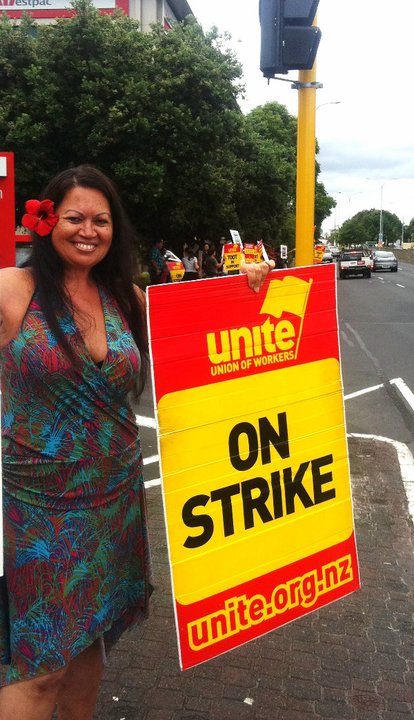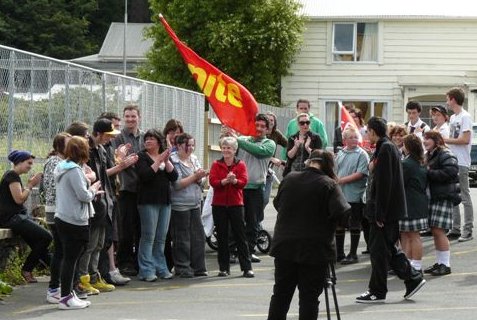
By Mike Kay
The comments made by the head of the Employers and Manufacturers Association that pay discrimination against women was justified because they may take sick days when they have their period has rightly provoked widespread outrage. It seems hard to believe that Alisdair Thompson thought he could get away with spouting such crap. But the fact is that he has the arrogance born of someone who has been getting his own way for years. His comments have to be seen against the sustained attack on the working class for a generation. Even under the so-called “worker-friendly” Labour led government of Helen Clark, inequality spiralled and union membership stagnated.
Over its term of office, the National/ ACT/ Māori Party coalition government has instigated a number of anti-worker laws. The 90 day “sack at will” law was initially brought in for the benefit of businesses employing 20 or fewer staff. That law has now been extended to be available to all employers. Other negative changes for workers include the right of an employer to demand a sick note after a single day’s absence without reason, restrictions on union access to the workplace and the removal of reinstatement as the primary remedy for unfair dismissal. Tau Henare’s privatemember’s bill on Secret Ballots for Strikes is currently before select committee. All these assaults have gone hand in hand with attacks on beneficiary rights, thus squeezing the working class at both ends – both in and out of work.
Continue reading “Alisdair Thompson and the Anti-Worker Laws”
Legal battle over sleepover shifts demonstrates union role in women's pay equity struggle
Horizontal labour market segregation on the basis of gender has been well-entrenched in New Zealand’s economy, including within the care sector which is majority-comprised of women workers. The following article by Kelly Pope – a member of the Christchurch branch of the Workers Party who works as a mental health support person – demonstrates the continued relevance of the workers’ movement and trade unionism in addressing equal pay issues.
In 2007 the Service and Food Workers’ Union (SFWU) and the Public Service Association (PSA) took cases against two major residential service providers in the intellectual disability sector, attempting to gain minimum wage pay for hours spent on sleepover shifts. After a decision by the Employment Relations Authority that considered sleeping over to be work, the issue was appealed to the Employment Court by IHC in May 2009. A support worker who was employed by IHC’s IDEA Services, Phil Dickson, was the individual applicant in this case.
Since then, the Employment Court has found the existing payment of sleepover rates to be in breach of the Minimum Wage Act, ruling in favour of Mr Dickson and the union. A subsequent case taken to the Court of Appeal by IHC has resulted in the same outcome. Since this decision on 16th February 2011, the case has been taken further by IHC and will now be considered by the Supreme Court with a decision expected sometime after this year’s general election. While this long legal process has been unfolding, the PSA has filed additional legal proceedings against more than thirty health and disability support employers also currently paying below minimum wage sleepover rates, including Barnardos, Hawkes Bay DHB, Spectrum Care and Healthcare NZ. Continue reading “Legal battle over sleepover shifts demonstrates union role in women's pay equity struggle”
Defend young workers, fight all anti-worker laws (article & main protest event details)
By The Spark editors
This weekend there will be demonstrations in a number of cities to oppose the re-introduction of youth rates and to oppose any extension to the new entrant rate provisions.
National has already attacked working people and unions by changing union access rights, introducing new conditions for access to sick leave, and introducing a probationary employment procedure which provides employers with the power to sack workers without reason in the first 90 days of employment.
John Key and National’s Minister of Labour Kate Wilkinson have not ruled out a return to youth rates and are clearly putting youth rates back in the frame for discussion. Wilkinson, for instance, has cited high youth unemployment as a reason for the government to take a close look at policies that will give work experience to youth.*
The ability of employers to legally pay youth rates below the adult minimum wage for 16-18 year-olds was brought to an end in 2007. This victory was a result of a combined industrial campaign by Unite Union, street campaign by Unite Union and Radical Youth, and parliamentary campaign led by then Green MP Sue Bradford. This was one of the more significant offensive campaigns waged by the labour movement over the past decade. For a whole generation of younger workers it was certainly the most significant.
We will fight any attempts by the bosses and government to roll back wages and conditions of workers of any age group. Continue reading “Defend young workers, fight all anti-worker laws (article & main protest event details)”
Update: Horticulture Workers' Dispute
 The May Issue of The Spark carried a story about a dispute involving horticulture workers at Southern Paprika Ltd in Warkworth. The owner of the Company has since made comments directed at the Union at a seminar organised by the Kiribati Protestant Church. Hamish Alexander is reported as saying:
The May Issue of The Spark carried a story about a dispute involving horticulture workers at Southern Paprika Ltd in Warkworth. The owner of the Company has since made comments directed at the Union at a seminar organised by the Kiribati Protestant Church. Hamish Alexander is reported as saying:
“One family got upset with us and decided to bring the union in, and as a company I can tell you that this has put a wall between me and my Kiribati people, and it’s a real problem.”
The Union Secretary, Ray Bianchi, has replied with the advice:
“Exercise your legal right and join the Union and ensure you get protection from manipulative Employers. Unionised Workers are treated better than non-Unionised and predominantly earn more.”
Press Release: Double-Down Burger Increases Workload for KFC Staff
 Workers say KFC’s infamous Double Down – a “bunless burger” consisting of chicken fillets, bacon, cheese and a special sauce – is increasing their workload.
Workers say KFC’s infamous Double Down – a “bunless burger” consisting of chicken fillets, bacon, cheese and a special sauce – is increasing their workload.
In Wellington alone, KFC sales increased 100% on the first day of the new promotion, and the product sold out for the first two days running. However, crew-members say the increased productivity has not paid off. Throughout the country there have been instances of customer abuse resulting from sold out product.
“The company’s making massive profits but it’s just making our lives harder,” KFC cook and Workers Party member Ian Anderson says.
Because of the hugely increased demand, many workers are giving up their breaks or working on their day off. “I’m used to being overworked and underpaid,” Ian says, “But when the work-load goes up the poverty wages stay the same.”
“The burger’s also not that amazing.”
Unite starts Facebook campaign against unfair sacking

Unite has launched a Facebook campaign for Pat Bidois, a union delegate at St Georges Language School who was unfairly dismissed. The page reads:
Management have been trying to get rid of Pat for years as she is an effective and passionate defender of workers rights on her site.
Continue reading “Unite starts Facebook campaign against unfair sacking”
Lessons of 1951: The Waterfront Lockout 60 Years On
By Josh Glue, Workers Party Hamilton Branch
The waterfront lockout of 1951 was one of the most important events in New Zealand labour history. For 151 days the men who worked the waterfront and those who supported them fought back against the combined power of the ship-owners and the state, determined to force cutbacks upon them and destroy their union. Seen as an historical defeat by some, an inspiring fight-back by others, the waterfront lockout holds important lessons to those who struggle for workers rights today.
In this first of two articles about this pivotal moment in the history of the working class of this country, we will look at the history of the Waterfront Workers Union and the events that led up to the lockout. In the second article, to be published in the April issue of The Spark Magazine, we will examine the way the lockout ended, the repercussions of that conclusion then, and the relevance of these events for working New Zealanders today.
Continue reading “Lessons of 1951: The Waterfront Lockout 60 Years On”
Victory for Dunedin Pizza Hut workers
Pizza Hut workers in Dunedin have battled for their rights against the bosses and won.
Dunedin’s two Pizza Hut stores were recently sold to new bosses. Upon taking ownership of the stores, the new bosses tried to force all the workers to sign new, individual contracts with inferior terms and conditions and a 90 day fire at will probationary period. This would be laughable if it wasn’t so outrageous – at the North D store the workers have been there for between two and eight years, and without a doubt know the job much better than their new employers!
What the manager clearly didn’t take into account was that these workers are union members. Both sites are Unite Union strongholds – the workers are staunch, aware of their rights, and aware of both the need to fight back and the power they have when they do so. All the workers refused to sign the new contracts, and today they walked off the job in protest.
Call centre workers strike to 'make a point to all those out there struggling with the same thing’
 Call centre staff who are members of Unite Union took strike action yesterday morning against their employer Salmat (also known as
Call centre staff who are members of Unite Union took strike action yesterday morning against their employer Salmat (also known as
Salesforce). Approximately 40 members took part in the action as part of the effort to achieve what will be their first pay rise in three
years. The worksite is located at the corporate complex on 666 Great South Road in Penrose, Auckland. With its objective of rebuilding amongst the vast unorganised sections of the working class, Unite has been present on the site for over two years.
Salmat is an outsource operation that holds contracts with major companies, one being Vodafone, for which Salmat has a contract for
handling both customer and business calls. In terms of the modern workplace it’s a success to have a strong union membership in an outsource operation.
Speaking from the picket line, Ross Asiata, one of Unite’s delegates at the workplace stated to media “Everything else around us increases, GST etc, but our pay rise (read ‘pay rate’) stays the same. As you can see behind me that’s the staff that are in the same boat as me, trying to make a point to management and to all those others that are out there struggling with the same thing”.
Casino workers hit New Year with festivity and militancy
Jared Phillips
SkyCity Casino workers in Auckland took strike action after the clock turned twelve on New Year’s eve, with more than 150 employees filing from the building and filling up its Victoria street side, and with the same number, combined, walking out from later shifts.
[youtube=http://www.youtube.com/watch?v=iUrlwMp3qGo]
Continue reading “Casino workers hit New Year with festivity and militancy”

